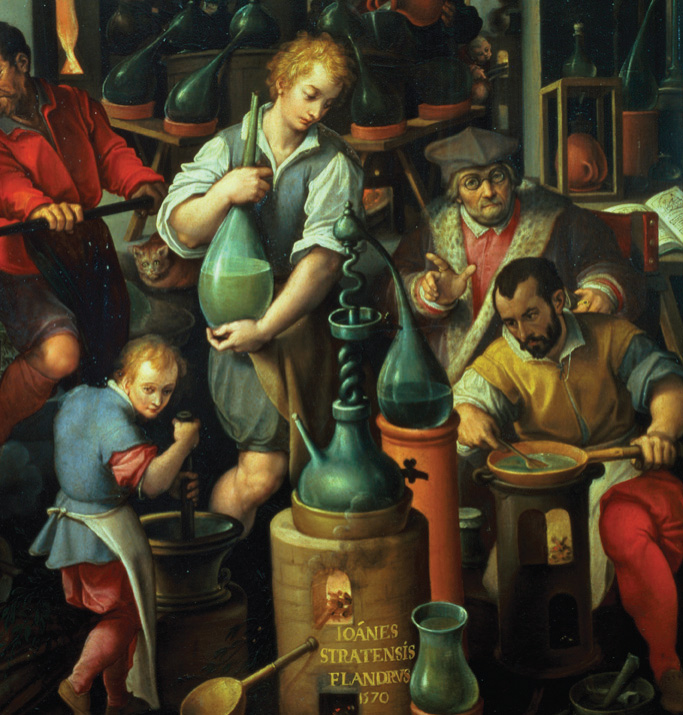HISTORY OF CHEMISTRY LECTURE: ALCHEMY
HISTORY OF CHEMISTRY LECTURE: ALCHEMY
Essential Question: What did alchemy contribute to the field of chemistry?
Learning Objective: Explore a brief history on the principles of alchemy and how some of those principles helped develop the filed of chemistry
SWBAT:
- Explore the contributions of alchemy to the field of chemistry
ASSIGNMENT: CK12 1.3: ALCHEMY
HMMM... BE READY TO PARTICIPATE
- What is alchemy?
- Have you ever heard about The Elixir of Life? The Philosopher Stone?

BRIEF HISTORY OF ALCHEMY TAKING FROM THE LINKS BELOW:
The word alchemy is thought to derive from an Egyptian word, 'chem' or 'qem,' or Khem meaning black — a reference to the black alluvial soils bordering the Nile. The Greek word 'chyma,' meaning to fuse or cast metals, established itself in Arabic as 'al kimia' from which alchemy is derived."
CHEM/QEM/KHEM (black) CHYMA ( to fuse or cast metals) to AL KIMIA (arabic term)
Alchemy is as old as the Pyramids (2000 BC). The concepts of Science and scientists had not been developed yet. Instead philosophers were the thinkers and creators of new ideas. When people think of Alchemy, they may also think of witchery and magical potions but alchemy was much more than that and may of the experiments performed lead to field of chemistry.
Alchemy was based on the ancient belief that the Earth is made up of four basic elements in nature: air, water, fire and earth itself along with three essential substances: salt, mercury and sulfur.
At the time, the periodic table of elements had not yet being created and the concepts of elements was very basic. Alchemists divided elements into groups such as "mature" and "immature ." According to alchemists, gold was the most perfect, mature metal because it contained the perfect balance of air, water, fire and earth. Alchemists thought that by changing the composition of the air, the water, the fire and the earth they could "transmute" (change) immature elements such as copper or lead into gold. This is process of changing base metals into gold or silver is known as The Philosopher Stone. (Links to an external site.)
The Philosopher Stone, thought to be a sort of powder, tincture or potion, was also thought to cure illness, prolong life and bring spiritual awareness. By drinking the potion, people could even achieve immortality. This was known as The Elixir of Life (Links to an external site.)
Alchemists were never able to turn base metals into gold or silver or achieved immortality, but many of the experiments they performed such as the heating of mixtures, the addition of corrosive salts to metals gave rise to the field of chemistry.
https://www.youtube.com/watch?v=gxiLuz9kHi0&t=47s (Links to an external site.)
Alchemy made important contributions to metalworking, refining, production of gunpowder, ceramics, glass, ceramics, ink, dyes, paints, cosmetics, extracts, liquors etc. Alchemists conceptualized chemical elements into the first rudimentary periodic tables and introduced the process of distillation to Western Europe. They were also among the first to extract metals from ores and compose various inorganic acids and bases.
Some examples:
- Sulfuric acid was first described (approx. 1300 AD) by the alchemist, Pseudo-Geber. Sulfuric acid is the most used substance in chemical industries today after water, air, coal and oil.
- The alchemist Andreas Libavius (1555 – 1616 AD) was the first to describe the preparation of free hydrochloric acid, of tin tetrachloride, and of ammonium sulfate.
- Libravius and Pseudo-Geber described the preparation of aqua regia (“royal water”), a mixture of nitric acid and hydrochloric acid, which can dissolve gold.
- The alchemist Albertus Magnus (1193-1280 AD) is often credited for the discovery of arsenic, although it was probably known to earlier alchemists.
- Chinese alchemists invented gunpowder or black powder in the 9th century.
- Indian alchemy made important contributions to metallurgy. High-quality, high carbon steel was already being produced in India between 300-200 BC, and was exported throughout Asia and Europe.
Prof. Jim Al-Khalili presents - 1001 Inventions: Journeys from Alchemy to Chemistry (Links to an external site.)
https://www.youtube.com/watch?v=65hejDgciFo (Links to an external site.)
IMPORTANT LINKS TO READ:
http://www.chm.bris.ac.uk/webprojects2002/crabb/history.html (Links to an external site.)
https://www.livescience.com/39314-alchemy.html (Links to an external site.)
https://www.smithsonianmag.com/history/alchemy-may-not-been-pseudoscience-we-thought-it-was-180949430/ (Links to an external site.)

